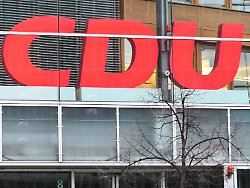Wednesday March 10, 2021
RTL / ntv trend barometer
For the Union it goes further down
The CDU / CSU and the Greens both give up one percentage point. Most Germans are pessimistic about the economic development in Germany. The moods in the federal states differ considerably.
The downward trend in the Union continues: Compared to the previous week, the CDU and CSU have lost another percentage point and still come to 33 percent in the trend barometer. The Union also achieved the same value in the 2017 federal election (32.9 percent). As in the previous week, this is the worst value since March 2020.
The Greens also lose one percentage point and reach 18 percent (2017 Bundestag election: 8.9 percent).
The FDP and AfD each win one point, nothing changes for the SPD, the Left and other smaller parties. The Social Democrats come to 16 percent (20.5 percent) in the trend barometer, the AfD to 10 percent (12.6 percent). The FDP and the Left are both 8 percent (10.7 and 9.2 percent, respectively). 7 percent would choose one of the other parties (5.2 percent). At 22 percent, the number of non-voters and undecided is slightly below the proportion of non-voters in the 2017 federal election (23.8 percent).
According to the current voting intentions of the Germans, 737 members would move into the Bundestag. The Union would gain 18 and the Greens 75 seats. All other parties would lose. The distribution of seats in the new parliament: CDU / CSU 264, Greens 142, SPD 126, Linke 63, FDP 63 and AfD 79 seats.
Against the background of the disputes over the current Corona policy, trust in the political competence of the Union is also falling. Compared to the previous week, the competence value of the CDU / CSU has fallen by five percentage points to 30 percent. That is ten percentage points less than at the beginning of January. However, the SPD and the Greens each trust only 6 percent of citizens to best cope with the problems in Germany. 8 percent consider one of the other parties to be competent, 50 percent do not approve of any party having political competence.
Habeck and Scholz almost on par with Laschet
In the case of the chancellor preference, CSU boss Markus Söder can consolidate his lead this week: If the Germans could elect their chancellor directly, 37 percent would opt for Söder (plus 1 percentage point). Green leader Robert Habeck would come against Söder to 18 percent (minus 1), SPD chancellor candidate Olaf Scholz to 15 percent (unchanged).
If the Union parties were to nominate the new CDU chairman Armin Laschet as candidate for chancellor, he would currently be almost on a par with his opposing candidates: Laschet would come to 22 percent (unchanged), Habeck to 21 percent (minus 1), Scholz to 20 percent (plus 2) .
The greatest pessimists live in Saarland
Most Germans remain pessimistic about the economic development in Germany in the coming years: 48 percent fear that the economic situation will worsen. 27 percent expect an improvement (minus two percentage points), 22 percent do not expect any change.
In relation to the individual federal states, the assessments are very different. Forsa asked almost 8,000 German citizens about their economic expectations. The greatest pessimists live in Saarland: 67 percent of Saarlanders fear that the economic situation in their federal state will worsen; only 9 percent hope for an improvement. The economic future is also assessed particularly pessimistically in Bremen (56 percent), Berlin (53 percent), North Rhine-Westphalia (51 percent) and Lower Saxony (50 percent). Hamburgers, Brandenburgers and Schleswig-Holsteiners, on the other hand, do not see the future of their countries as black: In Brandenburg and Schleswig-Holstein 40 percent each, and in Hamburg 38 percent expect economic conditions to deteriorate.
Economic expectations in the federal states
The economic conditions in the respective federal state will change in the coming years
improve / worsen
- Hamburg: 28/38
- Brandenburg: 28/40
- Schleswig-Holstein: 24/40
- Bavaria: 26/44
- Baden-Württemberg: 21/42
- Thuringia: 21/45
- Rhineland-Palatinate: 18/43
- Saxony-Anhalt: 15/43
- Mecklenburg-Western Pomerania: 18/46
- Saxony: 19/48
- Hesse: 19/48
- North Rhine-Westphalia: 18/51
- Berlin: 20/53
- Lower Saxony: 14/50
- Bremen: 11/56
- Saarland: 9/67
(Missing information on 100 percent: "remain unchanged" or "don't know".)
The data on party and chancellor preferences as well as political competence were collected by the market and opinion research institute Forsa on behalf of Mediengruppe RTL from March 2 to 8, 2021. Database: 2510 respondents. Statistical margin of error: +/- 2.5 percentage points. The data on economic expectations in the federal states were collected from February 18 to 26, 2021. Database: 7980 respondents.
. (tagsToTranslate) Politics (t) Polls (t) Federal Parliament election 2021 (t) Robert Habeck (t) Olaf Scholz (t) Markus Söder (t) Armin Laschet
